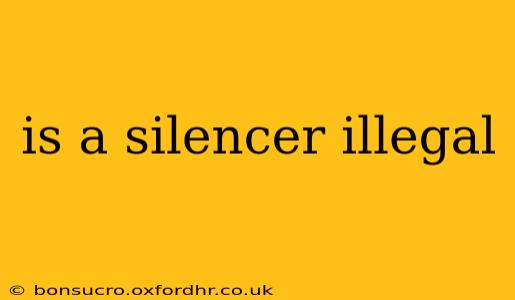The legality of silencers, often called suppressors, is a complex issue with significant variations depending on location. There's a lot of misinformation surrounding this topic, so let's clarify the situation. The short answer is: it depends. The longer answer requires understanding federal and state laws, as well as the specific regulations regarding ownership, possession, and use.
Federal Regulations on Silencers in the United States
At the federal level in the United States, silencers are regulated under the National Firearms Act (NFA) of 1934. This act classifies suppressors as "firearms" and subjects them to strict regulations. This means that purchasing a silencer involves:
- A thorough background check: This is more extensive than a typical background check for purchasing a firearm. It involves a more detailed application process and longer waiting periods.
- Paying a tax stamp: A significant tax is levied on the suppressor itself, adding to the overall cost.
- Registration with the Bureau of Alcohol, Tobacco, Firearms and Explosives (ATF): The ATF maintains a registry of all legally registered silencers.
State Laws and Local Ordinances
While federal law sets a baseline, individual states can impose additional restrictions or even outright bans on silencers. Some states may have stricter waiting periods, additional licensing requirements, or limitations on the types of firearms a suppressor can be used with. It's crucial to research your specific state's laws before considering purchasing a suppressor. Furthermore, some cities and counties may have local ordinances that further restrict or prohibit their use.
Always check your state and local laws before even considering owning a silencer. Failing to do so could result in serious legal penalties.
Common Misconceptions about Silencers
Many misconceptions surround silencers. It's important to clarify these points:
- Complete silence: Silencers don't make firearms completely silent. They significantly reduce the sound, but the gunshot will still be audible. The level of sound reduction varies depending on the design of the suppressor and the firearm it's used with.
- Easy acquisition: The process is far more involved than purchasing a standard firearm, due to the NFA regulations.
- Automatic association with crime: While silencers can be used in criminal activity, their use is not inherently illegal and many law-abiding citizens own them for legitimate purposes, such as hunting, sport shooting, and hearing protection.
Legitimate Uses of Silencers
While often portrayed negatively in media, silencers have legitimate uses:
- Hearing protection: For frequent shooters, a suppressor can dramatically reduce noise exposure, protecting hearing health.
- Hunting: Reduced noise can lead to less disturbance of wildlife and a more ethical hunting experience.
- Competitive shooting: Many competitive shooting disciplines utilize suppressors to reduce noise and improve accuracy.
Navigating the Legal Landscape
Navigating the legal complexities of silencer ownership can be challenging. It's strongly recommended to consult with a legal professional specializing in firearms regulations to ensure compliance with all applicable federal, state, and local laws. Ignoring these regulations can lead to significant legal consequences, including fines and imprisonment.
Disclaimer: This information is for educational purposes only and does not constitute legal advice. Always consult with legal professionals and relevant authorities for accurate and up-to-date information regarding silencer laws in your specific jurisdiction.
